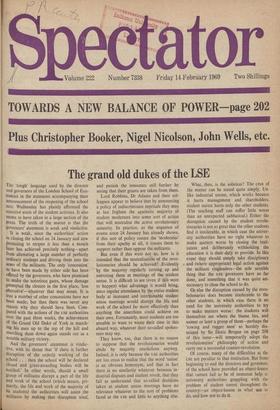The grand old dukes of the LSE
The 'tough' language used by the director and governors of the London School of Eco: nomics in the statement accompanying their announcement of the reopening of the school next Wednesday has plainly affronted the sensitive souls of the student activists. It also Seems to have taken in a large section of the press. The truth of the matter is that the governors' statement is weak and vindictive.
It is weak. since the authorities' action in closing the school on 24 January and now promising to reopen it less than a month later has achieved precisely nothing—apart from alienating a large number of perfectly ordinary students and driving them into the arms of the militants. The only 'concession' to have been made by either side has been offered by the governors, who have promised to make the notorious gates, whose damage prompted the closure in the first place, 'less obtrusive'—whatever that may mean. It is true a number of other concessions have not been made; but then there was never any reason why they should have been. Com- pared with the actions of the LSE authorities over the past three weeks, the achievement of the Grand Old Duke of York in march- ing his men up to the top of the hill and marching them down again stands out as a notable military victory. And the governors' statement is vindic- tive, with its threat that 'if there is further disruption of the orderly working of the school . . . then the school will be declared closed and grant-awarding bodies will be notified.' In other words, should a small group of militants disrupt a part of the life and work of the school (which means, pri- marily, the life and work of the majority of its students) the authorities will assist the militants by making that disruption total, and punish the innocents still further by seeing that their grants are taken from them.
Lord Robbins, Dr Adams and their col- leagues appear to believe' that by announcing a policy of indiscriminate reprisals they may at last frighten the apathetic majority of student moderates into some sort of action that will neutralise the active revolutionary minority. In practice, as the sequence of events since 24 January has already shown, if this sort of policy rouses the 'moderates' from their apathy at all, it rouses them to support rather than oppose the militants.
But even if this were not so, how is it intended that the neutralisation of the revo- lutionaries should be achieved? Evidently by the majority regularly turning up and outvoting them at meetings of the student union. It is difficult to see (even if this were to happen) what advantage it would bring, since regular attendance by the entire student body at incessant and interminable student union meetings would disrupt the life and work of the school far more effectively than anything the anarchists could achieve on their own. Fortunately, most students are too sensible to want to waste their time in this absurd way, whatever their so-called spokes- men may say.
They know, too, that there is no reason to suppose that the revolutionaries would abide by majority resolutions anyway. Indeed, it is only because the LSE authorities are too crass to realise that the word 'union' is an obvious homonym, and that in fact there is no similarity whatever between in- dustrial disputes and student revolt, that they fail to understand that so-called decisions taken at student union meetings have no relevance whatever to the sort of problems faced at the LSE and little to anything else. What, then, is the solution? The crux of the matter can be stated quite simply. Un- like industrial unrest, which works because it hurts management and shareholders, student unrest hurts only the other students.
(The teaching staff can suffer little worse than an unexpected sabbatical.) Either the disruption caused by the student revolu- tionaries is not so great that the other students find it intolerable, in which case the univer- sity authorities have no right whatever to make matters worse by closing the insti- tution and deliberately withholding the education it is their duty to provide. In this event they should simply take disciplinary • and (where appropriate) legal action against the militant ringleaders—the sole sensible thing that the LSE governors have so far done, and something that it was quite un- necessary to close the school to do.
Or else the disruption caused by the revo- lutionaries does become intolerable to the other students, in which case there is no need for the university authorities to try to make matters worse: the students will themselves see where the blame lies, and sooner or later a group of them—perhaps the 'rowing and rugger men' so harshly dis- missed by Sir Denis Brogan on page 208 of this issue—will temporarily adopt the revolutionaries' philosophy of action and carry out a successful counter-revolution.
Of course, many of the difficulties at the LSE are peculiar to that institution. But from beginning to end the directors and governors of the school have provided an object-lesson that cannot fail to be of immense help university authorities grappling with the problem of student unrest throughout thL country—an object-lesson in what not to do, and how not to do it.


































